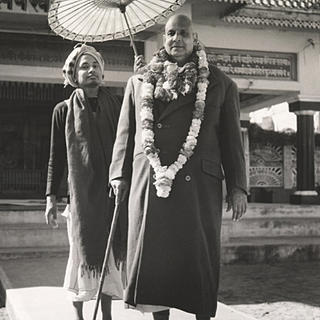A Light on Yoga - B.K.S. Iyengar
- sivanandaashram
- Jun 24, 2018
- 2 min read

To overcome the obstacles and to win unalloyed happiness, Patanjali offered several remedies. The best of these is the fourfold remedy of Maitri(friendliness), Karuna (compassion), Mudita (delight) and Upeksa (disregard).Maitri is not merely friendliness, but also a feeling of oneness with the object of friendliness (atmiyata). Patanjali recommends maitri for sukha (happiness or virtue). The yogi cultivates maitri and atmiyata for the good and turns enemies into friends, bearing malice towards none.Karuna is not merely showing pity or compassion and shedding tears of despair at the misery (duhkha) of others. It is compassion coupled with devoted action to relieve the misery of the afflicted.
The yogi uses all his or her resources – physical, economic, mental or moral – to alleviate the pain and suffering of others. The yogi shares strength with the weak until they become strong; shares courage with the timid until they become brave. The yogi becomes a shelter to one and all.Mudita is a feeling of delight at the good work (punya) done by another, even though he may be a rival. Through mudita, the yogi saves himself or herself from much heart-burning by not showing anger, hatred or jealousy for another who has reached the desired goal which she/ himself has failed to achieve.Upseka: It is not merely a feeling of disdain or contempt for the person who has fallen into vice (apunya) or one of indifference or superiority towards him/her. It is a searching self-examination to see how far one is responsible for the state into which the unfortunate one has fallen and the attempt thereafter to put him/her on the right path. The yogi understands the faults of others by seeing and studying them first in himself. This self-study teaches him/her to be charitable to all.
The deeper significance of the four-fold remedy of maitri, karuna, mudita and upeksa cannot be felt by an unquiet mind. My experience has led me to conclude that for an ordinary man or woman in any community of the world, the way to achieve a quiet mind is to work with determination on two of the eight stages of Yoga mentioned by Patanjali, namely, asana and pranayama.The mind (manas) and the breath (prana) are intimately connected and the activity or the cessation of activity of one affects the other. Hence Patanjali recommended pranayama (rhythmic breath control) for achieving mental equipoise and inner peace.
Extract from the Introduction to LIGHT ON YOGA






Comments